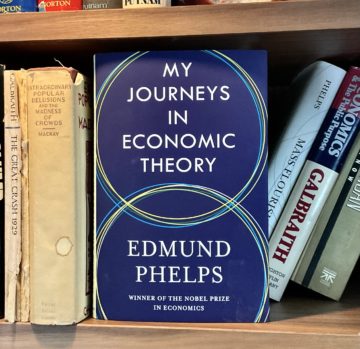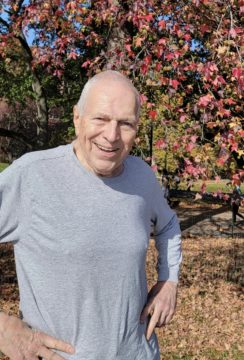by Michael Liss
Let us try before we die to make some sense of life. We’re neither pure nor wise nor good; we’ll do the best we know; we’ll build our house and chop our wood and make our garden grow. —From Candide, Music by Leonard Bernstein, Lyrics by Richard Wilbur
 On page 184 of Edmund Phelps’ new book, My Journeys In Economic Theory, he tells the story of a lunch party with friends, at which, presumably after the plates were cleared (but not the glasses), the then 80-something-year-old 2006 Nobel Prize winner in Economics belted out “Garden Grow.”
On page 184 of Edmund Phelps’ new book, My Journeys In Economic Theory, he tells the story of a lunch party with friends, at which, presumably after the plates were cleared (but not the glasses), the then 80-something-year-old 2006 Nobel Prize winner in Economics belted out “Garden Grow.”
My kingdom for a YouTube of that one. If you wanted to characterize the second part of Ned Phelps’ career, you might very well have started with that bit of Candide and Phelps’ connection to the text of Voltaire’s book. The activity of work is fundamental to human happiness. Work need not define the whole of us, but it should provide challenges, a sense of worth, and an opportunity to participate in community itself. Work has value beyond a paycheck. With work, we create something for ourselves, and, as Phelps convincingly argued in his 2013 book, Mass Flourishing: How Grassroots Innovation Creates Jobs, Challenge, and Change, each person, in his or her own way, may also contribute to innovation that moves both the economy and society forward.
There is a dual-mindedness to Phelps, an intellectual fluidity, that makes you pay attention. In 2011, I heard him present at the 9th annual conference of Columbia University’s Center on Capitalism and Society. Phelps had co-founded the Center (with Roman Frydman) in 2001. While speaking of the essentialness of work, he added what seemed to be a fairly controversial, if throwaway, comment. I’m paraphrasing here a bit, but the import of what he said was that a government policy that favored the wealthy was not in and of itself bad, if part of the object of the policy was to help foster an atmosphere where any individual could achieve self-realization and growth.
The remark was noticed (later, in fact, quite angrily by the person behind me in a refreshment line who decided my face was a sympathetic one and who let loose a tirade), and it seems emblematic of Phelps’ thinking outside of established orthodoxies. My Journey is very much a story of his reexamining commonly accepted truths, sometimes building on them, and sometimes challenging them.

It takes a healthy ego to do that—in academia, one can risk advancement by deviating too much. Phelps plainly felt the sting of rejection, when, even after publishing several papers and a book while at the Cowles Foundation, he was denied tenure at Yale. He describes his strained relationship with James Tobin, who headed Cowles (and was himself a future Nobel Prize winner) in painful terms.
His experience at Cowles taught him a lesson:
I had not set out to do what got me into the economics profession in the first place. I had gone to graduate school and then on to a research center to connect the macroeconomics in the textbooks—namely, the theory created by Keynes—to the microeconomics in the textbooks—namely the neoclassic theory rising from Carl Menger, Leon Walras, and Alfred Marshall to Frank Ramsey, Arthur Pigou, and (Gérard) Debreu.
Phelps didn’t make that mistake again, and, where some others with less drive might have faltered, he didn’t. Bring to his new book an open mind as autobiographical works can be tricky things. Sometimes they seem like acceptance speeches at the Oscars, a synthetic mixture of thank-you’s with a dollop of humblebrag. Phelps escapes that by being himself—he knows he is gifted, and he doesn’t mind people knowing that he knows. It’s a bit Ben Franklin-like: he’s having fun being smart and accomplished. The life to which his talent and drive led him—going to the right Ivies and the London School of Economics, working for prestigious institutions, getting published, spending time at Stanford (where he and John Rawls became friends), earning tenure at the University of Pennsylvania and later at Columbia (where he has spent the last half-century), consulting for governments, organizing conferences, getting called to Stockholm for a Nobel Prize—has been a very good life. He recounts his time in London, Paris, and Rome, his interactions with fellow economists and philosophers, and his many professional collaborations with a great deal of pleasure.
Not only has it been a good life, but it has also been one earned with real accomplishments. His early work at Cowles included research on the sources of economic growth. A paper on “The Golden Rule of Accumulation,” published in 1961, sought to determine the rate of savings that maximizes the steady-state level of the growth of consumption—in plainer English, how much can (and should) one generation spend, while leaving enough for the successive one to maintain a similar standard of living.
Phelps seems a bit bemused that his Golden Rule earned as much attention as it did, quite possibly having written it more as a riff than a deeply serious work. Riff or not, it was cited 45 years later in the Nobel Committee’s announcement of his prize. Also cited was his work on “intertemporal tradeoffs in macroeconomic policy,” the balance between unemployment and inflation. Phelps challenged the Phillips Curve, questioning the conventional wisdom of the time that the tradeoff between unemployment and inflation was stable, so that Government policy makers could effectively choose (and adjust, if wanted) a set relationship. Phelps’ insight was that choices were also occurring at the micro level, as both businesses and workers made decisions based on expectations of inflation. There was no single, all-powerful switch.
I am just scraping the surface here of Phelps’ work, and with far less coherence than someone fluent in economics would, but there’s an interesting re-direct in what I’ll call the Phelps Curve. As the 1990s approached, and partially because of the sustained downturn in Europe, Phelps began to revisit some of the sureties of Keynesian theory. Given that he had been so critical in providing the microeconomic underpinnings of it, it was a bold step, but having challenged orthodoxy before, he decided to do it again. He began to develop a new theory of the equilibrium path itself—a theory to determine the natural unemployment rate. The models built and their first statistical test were set forth in Structural Slumps: The Modern Equilibrium Theory of Unemployment, Interest and Assets. That work, which introduced three different models for evaluation, ran into professional resistance, particularly from those economists who were more classically inclined. Reading through his current discussion of that book and its reception, you sense more than a little frustration in him. You also get a very strong sense that he wasn’t ready for the sidelines.
He wasn’t, turning his attention to work itself, to the value of it. In 1997, he published Rewarding Work: How To Restore Participation and Self-Support in Free Enterprise. In it, he introduced two new lines of discussion, the value of self-support, and the value of participating in the work going on in society. To this, he added the fairly controversial idea of employment or wage subsidies. Give employers additional resources to hire and pay, and from that you increase worker participation and satisfaction.
So, what draws me to Phelps, if the “science” is pitched at too high an angle for me to climb? From an intellectual perspective, it’s the latest portion of his work, starting with the ideas that were organized and expressed in Mass Flourishing. Recalling his Conference comment showing relative indifference to who benefits the most from a government policy if all do, his emphasis on the net positive effect of an innovative, highly competitive economy on consumers, producers, and workers alike stands out.
Humans flourish when challenged, and, in a dynamic, competitive economy, they have an opportunity to engage. The worker need not be a drone performing a monotonous task, but an active participant, if the economy reflects those values. Phelps worries about the loss of dynamism, both in Europe and the United States. If Capitalism and the values of the Enlightenment are really superior to Socialism or Corporatism, with their more restricted views of personal freedom, then Capitalism needs to draw in labor with both adequate compensation and work that makes labor a partner in endogenous innovation. A barren job with a barely adequate paycheck will not do it.
This is a compelling and timely argument. That Ned Phelps is still making it forcefully, still trying to make our Garden Grow, is reason enough to recommend the book.
My Journeys In Economic Theory is available from Columbia University Press.
You can also see a conversation with Professor Phelps and Richard Robb
